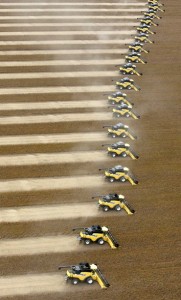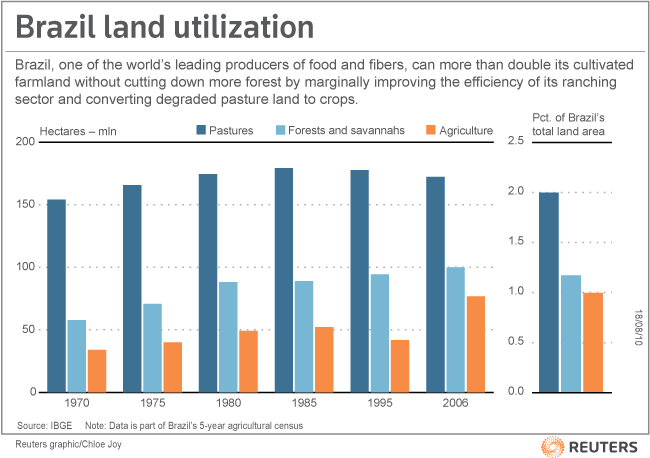Reuters | Tue Aug 24, 2010
• Foreign land owners may see more red tape in medium term
• Annulling past land purchases seen unlikely
By Reese Ewing
SAO PAULO, Aug 24 (Reuters) - Brazil's essential role as a provider of food for the world's expanding population is at risk if the government makes good on threats to curtail foreign investment in farmland.
The late Nobel laureate and U.S. agronomist Norman Borlaug, who is widely recognized as the father of the Green Revolution, predicted Brazil would become the world's breadbasket in the 21st Century, as the United States was in the 20th.
Abundant sun, rain and land that can yield two grain crops a year when other countries only get one leaves little doubt that food production in Brazil will expand. It has enough land to double current planted area. Even cattle and trees grow faster than in most other countries.
But the government's growing fear of losing control of domestic food production could end an era of strong foreign investment in farmland, which economists say is needed if Brazil is to help avert a repeat of the global food shortages in 2008.
There are simply no large-scale alternatives to Brazil's unique agricultural potential.
"Brazil is very well positioned at the moment as one of the most desirable agricultural investments in the world," General Manager of South American Soy Phil Corzine told Reuters. "From a purely economic perspective, they could make a huge mistake if they scare away foreign capital."
"The U.S. has made some bad decisions in the past regarding foreign investment and I hope Brazil doesn't take this road."
Corzine, a U.S. grain farmer, is just one of many foreign investors that have been drawn to the productive potential and price of Brazilian agricultural land in the past decades.
Brazil is the world's largest exporter of sugar, coffee, orange juice, tobacco, beef and poultry. It is also a major producer of pulp and paper, soybeans, corn and rice.
Foreign funds have frozen land acquisition plans since June, when outgoing President Luiz Inacio Lula da Silva said he was concerned about local land falling into foreign hands.
Guilherme Cassel, his agrarian development minister, went further, saying that the Lula government did not want or need foreigners to buy farmland or produce in Brazil.
"Brazilian land must stay in the hands of Brazilians," he said, adding that the government is preparing a constitutional amendment to limit and potentially annul land titles acquired by foreigners after a yet undefined date in the past.
Attorney Andre Passos, a partner at Buranello Passos in Sao Paulo, dismissed talk of annulling titles retroactively as unconstitutional and political campaigning during an election year.
"Brazil needs foreign investment in this sector. It cannot do it alone," Passos said.
Even if investment funds' fears are overblown, additional layers of bureaucracy may be coming to the Byzantine legal hoops foreign investors must currently jump through.
The World Bank Group's Doing Business report ranks Brazil as 120 out of 183 countries on the ease of registering property.
Graphic on Brazil's total farmland usage:
Factbox on Brazil's farming potential:
Although they have downplayed the risks, multinationals such as France's Louis Dreyfus and Britain's BP that snapped up distressed assets in the ethanol sector over the past few years have billion-dollar investments at stake.
Analysts estimate that over 20 percent of Brazil's cane sector is now in foreign hands, which has spurred criticism from Lula's preferred successor and presidential candidate, Dilma Rousseff, who has widened her lead in the polls less than a month and a half before the Oct. 3 election.
A constitutional amendment will certainly not be passed in 2010. Even if Rousseff wins, passage would require two plenary votes from the Senate and lower house with a three-fifths majority, which would require considerable political capital.
On Monday, the Attorney General published a finding on a 1971 law that closed a loophole allowing foreign investors to open locally registered companies and purchased land without restrictions on the size of land holdings that foreign capital is subject to.
With no mention of retroactive application of the law or annulling previous purchases by foreigners, the finding suggests that the government is backing off its earlier more radical stance.
Brazil's official notary offices that register sales of land will also begin to build a database on all titles owned by foreign controlled groups. And Brazil's land reform institute Incra will have to clear new purchases by foreign-controlled companies.
"There is concern about the extent of foreign ownership. It's a natural concern in any country," Agriculture Minister Wagner Rossi said. "It's important we have a good basis of knowledge to shape policy."
CHINA'S COMING
Following Japanese, Argentine, U.S. and South Korean investors, Chinese companies have recently announced plans to invest in Brazilian farmland, as the world's largest importer of soybeans reaches out to shore up its food security.
Zhang Jianhua of Bank of China in Brazil said the two Chinese companies, which were planning to buy land for grains and palm production in the northeast that the bank is in talks with, "so far, do not appear to have suspended their plans."
Argentina's Los Grobo acquired large tracts of land in Brazil recently and said earlier this year it was considering more.
A tropical growing season and abundant water also makes Brazil home to the future expansion for many paper and wood products producers such as the Nordic Stora Enso.
If foreign capital and demand are sidelined, the value of rural properties in Brazil could be hurt or stagnate.
But the government has support from the rural lobby.
"Foreign interests, whether operating in Brazil or not, are in essence competition for the local producers," Rossi said.
Land in Brazil's underdeveloped frontier areas in the center-west and northeast has been in high demand and is expected to appreciate most in the coming years.
A hectare (2.47 acres) of land ready for production in the northeast or center-west can cost about 5,000 reais ($2,860). But areas in the developed southern farming states with easy access to ports can reach 12,000 reais/ha for pasture and 20,000 to 50,000 reais/ha for grain fields, analysts estimate.
A recent study by consultants AgraFNP showed that farmland appreciation in the frontier areas in the northeast such as in Tocantins, Piaui and Maranhao over the last three years has ranged from 54 percent to 70 percent.
Larger land owners in Brazil, whose access to credit had given them a significant advantage to snap up distressed competitors when opportunities arose, have now had to compete more with deep-pocketed foreigners.
The central bank reported that Brazilian agriculture received $26 million in direct foreign investment in April, up 225 percent from the same period of 2009. Between 2002 and 2008 foreign direct investments in agricultural land registered with the bank reached $2.43 billion.
"Gone are the days when you could buy land in the center-west for a few packs of cigarettes a hectare," said Kory Melby, an American farmer who relocated to Brazil over a decade ago and works as an analyst and consultant in the sector. (Editing by Alden Bentley)














